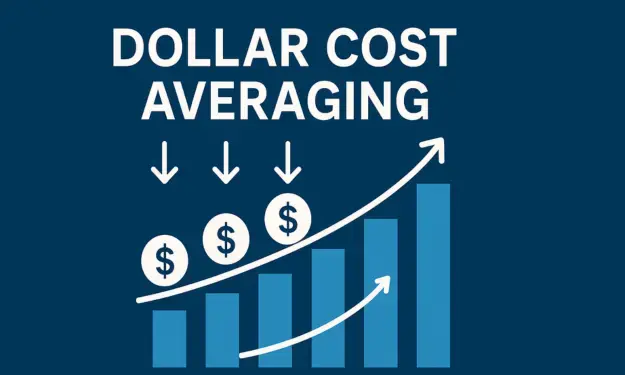What is dollar cost averaging?
Publication date: May 22, 2025

You can set aside a modest amount each month and are looking to start investing for the long term. Given that financial markets fluctuate continuously, determining the right moment to enter the market is particularly challenging. This has become especially true since the recent U.S. presidential elections, as markets have experienced significant volatility under President Trump's administration. This week, the Dutch Authority for the Financial Markets (AFM) issued a warning about the potential for increased market shocks due to Trump’s policies. Moreover, many stocks and stock indices are currently at complex or uncertain levels.
Our algorithm indicates that the most likely scenario is a continuation of the upward trend. However, the possibility that the AEX index first dips below 784 before resuming its rise remains present in the system and therefore cannot be ruled out. In summary, while there are plenty of opportunities, timing remains highly challenging at this moment.
To illustrate recent movements in the AEX, please find below a chart covering the past 12 months. Over this period, the AEX has delivered a return of +1.8%. The chart highlights the index’s volatility example, a 9% decline in July 2024 followed by a choppy sideways trend, and of course, the extreme price swings in April, with a drop of 16% followed by a rebound of 19%.

The solution to the increasingly large shockwaves in the stock markets for investors who can invest a fixed amount each month and have a horizon of at least five years is Dollar Cost Averaging (DCA). Below, we explain the DCA approach and present two investment plans.
Dollar Cost Averaging (DCA) is an investment strategy where you invest a fixed amount at regular intervals regardless of the stock price or other asset you want to invest in. This method is often used to invest in stocks or crypto to reduce the impact of market volatility.
How does it work?
Instead of investing a large amount all at once, you spread your investment over time. For example, rather than investing €1200 in one go, you invest €100 per month over 12 months.
Benefits
-
Less timing risk: You do not need to predict the best moment to buy
-
Average purchase price: You buy fewer units when prices are high and more when prices are low
-
Disciplined approach: Encourages regular and consistent investing
When to use it
-
When investing in volatile markets, especially crypto
-
When you do not have a large amount available to invest at once
-
For those who want to build wealth calmly over the long term
DCA plan for the AEX (example)
-
Goal: Long-term wealth building through the AEX
-
Investment instrument: AEX ETF
-
Starting amount: €0 (only periodic contributions)
-
Monthly contribution: €150
-
Investment horizon: 5 years
-
Contribution timing: First Monday of each month
Projection (example calculation)
-
Average annual return of the AEX (historical): around 7 percent
-
Total contribution over 5 years: €150 x 12 months x 5 years = €9.000
-
Estimated average value after 5 years at 7 percent return: around €10.525 to €11.250, depending on market performance and costs
Why this works
-
During market drops, you buy at lower prices and receive more ETF shares
-
During market rises, you steadily build value
-
You remove emotion and timing decisions from the process
You may not only want to build wealth in a relatively calm way but also look for more challenges to accelerate growth. You could consider combining the AEX with Bitcoin. Note that Bitcoin is highly volatile but historically also successful. Below is a plan that involves more risk but is expected to perform better. Due to the large price swings in Bitcoin, we have shown two possible outcomes.
First, you will find the price movement of Bitcoin over the past 11 months. Bitcoin has seen an increase of 56 percent but also experienced a drop of 30 percent.
Below you will first find the price movement of Bitcoin over the past 11 months. Bitcoin has seen an increase of 56 percent but has also experienced a decline of 30 percent.

DCA Plan: AEX + Bitcoin
-
Total monthly contribution: €300
Allocation
-
€150 in AEX ETF
-
€150 in Bitcoin
Investment horizon: 5 years
Starting capital: €0 (monthly contributions only)
Contribution timing: First day of each month
Expected Scenarios (simulation over 5 years of investing)
|
Investment
|
Monthly Contribution
|
Total Invested
|
Expected Annual Return
|
Estimated Value After 5 Years
|
|---|---|---|---|---|
| AEX ETF | €150 | €9.000 | 6 to 8 percent | around €10.500 to €11.500 |
| Bitcoin | €150 | €9.000 | 15 to 30 percent (volatile) | around €14.000 to €33.000+ |
| Total | €300 | €18.000 | — | around €24.500 to €44.500 |
Note: Bitcoin is extremely volatile. This simulation is based on a positive scenario. AEX is more stable but offers lower growth potential.
Strategic Considerations
-
Diversification – AEX provides stability while Bitcoin offers growth potential
-
Risk spreading – Exposure to both traditional and digital assets
-
Inflation hedge – Bitcoin is often seen as digital gold
-
No market timing needed – You buy during both highs and lows, which smooths out your average cost
Conclusion
Timing the market is difficult and is expected to become even harder due to increased volatility. Investing a fixed amount each month, as explained above, removes the need for market timing. With DCA, it is possible to achieve strong returns over five years in a relatively simple and structured way without needing a large upfront investment. This makes DCA especially suitable for new investors and those who can only invest a monthly amount.
Disclaimer: Investing involves risk. Our analysts are not financial advisors. Always consult an advisor when making financial decisions. The information and tips provided on this website are based on our analysts' own insights and experiences. They are therefore for educational purposes only.

.svg)



